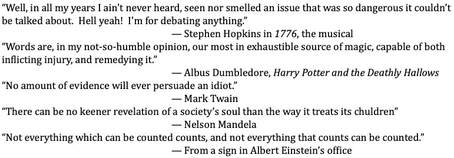One of my favorite authors (whose fictional works I return to with some frequency) is Isaac Asimov; Professor of Biochemistry; author of many scholarly works, as well as well-known works of science fiction and mystery; noted Sherlockian (member of The Baker Street Irregulars); sometime Shakespearian scholar; etc. He commented about many different things during his life and I find much of what he said to be worth considering. Perhaps you will, too.
Probably because he was an active teacher (Professor) for much of his life, Asimov seems to have had some strong feelings regarding education. One of the things he said about learning was that:
The true delight is in the finding out rather than in the knowing.
I agree (obviously). I find real joy in discovering things I didn’t know, provided that I have some interest (momentary or long-standing) in them. This reminds me of another of his ideas which really struck me when I first encountered it:
People think of education as something they can finish.
That, of course, is a ridiculous notion. As far as I am concerned when you stop learning, you are effectively dead, or might as well be, and Asimov seems to agree with that sentiment.
Asimov explained this idea in specific relation to the United States this way:
There is a cult of ignorance in the United States, and there has always been. The strain
of anti-intellectualism has been a constant thread winding its way through our political
and cultural life, nurtured by the false notion that democracy means that ‘my ignorance
is just as good as your knowledge.’
Okay, Asimov died in 1992, but he MIGHT have been talking about today with these last two quotes of his:
When stupidity is considered patriotism, it is unsafe to be intelligent.
And:
Violence is the last refuge of the incompetent.
Okay, let’s look at some thoughtys from someone else. I’m old enough to remember Edward R. Murrow, who practically invented broadcast news. Personally, I would also include John Cameron Swayze among the “inventors.” (He was on NBC-TV about the time that Murrow was on CBS). Since Murrow was in the broadcast news industry, his comments might be considered political, but they are from long enough ago that I consider them to be just things to think about. They are offered here just as that, not as specific commentary on any, specific person(s) or situation(s). If you don’t choose to take them that way, that’s YOUR choice, I just offer them as worthy of thought…
I am particularly fond of THIS quote. I think a good many people should stop to consider their attitude towards the idea expressed here.:
We must remember always that accusation is not proof and that conviction depends
upon evidence and due process of law. We will not walk in fear, one of another. We will
not be driven by fear into an age of unreason, if we dig deep in our history and our
doctrine, and remember that we are not descended from fearful men – not from men
who feared to write, to speak, to associate, and to defend causes that were, for the
moment, unpopular.
Murrow also said a number of other things worthy of consideration. Here are a few of them:
We cannot defend freedom abroad by deserting it at home.
and
A nation of sheep will beget a government of wolves.
and
We must not confuse dissent with disloyalty. When the loyal opposition dies, I think the
soul of America dies with it.
Lest anyone think that I’m spending too much time on politically oriented stuff, I will switch to some quotes I like which relate to what I have spent much of my own lifetime doing — the theatre. Lots of people have ideas about many aspects of theatre, some, I think, are worth noting.
I don’t remember exactly where this came from, but it was an article discussing the author/playwright, Thornton Wilder. I was involved with at least three productions of one of his plays (Our Town) during my career. I even played The Stage Manager (a major character in that play, for those who don’t know) in one of those productions.
“A novel is what took place”, he says — the same is even more obviously true of a
history book — and he contrasts this with theatre: “A dramatist is one who believes
that the pure event, an action involving human beings, is more arresting than any
comment that can be made upon it. On the stage it is always now; the personages
are standing on that razor-edge, between the past and the future, which is the essential
character of conscious being; the words are rising to their lips in immediate spontaneity…
The theater is supremely fitted to say: ‘Behold! These things are.’”
Wilder was, of course, approaching this notion as an author, but I think the idea speaks, at least to some extent, for ALL true theatre people. Perhaps not those few who are just in it for self-aggrandizement, whose real focus is on whether they are “stars,” but real THEATRE people. There IS a difference, and I think Wilder was speaking for us. He was also speaking for us when he said:
I regard the theater as the greatest of all art forms, the most immediate way in which
a human being can share with another the sense of what it is to be a human being.
This supremacy of the theater derives from the fact that it is always "now" on the stage.
That doesn’t mean that different productions of a play will not (or shouldn’t be) different. No, as Wilder also said:
Many plays — certainly mine — are like blank checks. The actors and directors put
their own signatures on them.
That brings to mind a pet peeve of mine; all too often I hear people say about a play (or a book): “No, I don’t want to see (read) that again, I’ve already seen (read) it!” I’ve always found that a GOOD play (or book) can hold up to being experienced more than once. That doesn’t mean you have to start it over again immediately after the first time, but a GOOD work (good music, good visual art, etc.) can be enjoyed more than once, thank the Lord, or the world would be a pretty drab place. One can see from this quote that Ian McKellen (who should need no introduction) seems to agree with me and says it quite well.
You know, if someone says, ‘Oh, I won't come see Hamlet because I've already seen
another production.’ It's rather like saying, ‘No, I don't need a towel. I've already
got one.’ Well, you can--Hamlet is, you know… it's a play you might respond to in
a different way as you get older. There are lots of people at different ages in the play
and they've all got a point of view. And perhaps you become more sympathetic to
the older characters as you get older.
Sir Ian has further commented on this topic when he said:
My performances are always designed for people who haven't seen the play before.
It's no help when a friend comes around, as they did to my first Hamlet, and said,
‘Congratulations, you’re our 73rd Hamlet.’ I don't think there's any need to see
Hamlet 73 times. But, there is a need to see it more than once.
McKellen even suggests a methodology for approaching classics, like Shakespeare’s plays, which goes a long way (at least to me) of justifying the modern attempts in racial and gender neutral casting, playing with geographical and historical time settings, etc. Note: I don’t think one can suggest that McKellen is for “change for change’s sake,” but he does say:
If you start as a director by saying, ‘How can we make this play available to a
bright 14-year-old who's prepared to give us two or three hours of their precious
time,’ rather than saying, ‘Oh, everybody knows this play. How can we make it
different?’… it won't inhibit you. You'll still get productions which vary and have
a different emphasis and a different attitude, a different style, and that's absolutely
fine. But I think it should always be done with a new audience in mind.
He doesn’t say it here, but I think he would agree that by trying to communicate with that new audience you just MIGHT offer up some new light to a returning one, as well.
As one with a considerable fondness for the world of Sherlockania (not a driving passion, but a definite interest) as well as one who has spent his life trying to assist others to acquire information and skills, I am quite fond of Sherlock Holmes’ notion of how the brain works. I’m not as rigid as he claims to be in suggesting that one should make an effort to promptly forget anything which is not immediately useful. I would suggest that it is difficult to know what may be useful tomorrow (or next week or year) when one is confronted with ideas and/or information which are new and/or different from what has been previously encountered.
Holmes said:
I consider that a man's brain originally is like a little empty attic, and you have to
stock it with such furniture as you choose. A fool takes in all the lumber of every
sort that he comes across, so that the knowledge which might be useful to him
gets crowded out, or at best is jumbled up with a lot of other things, so that he
has a difficulty in laying his hands upon it. “Now the skillful workman is very careful
indeed as to what he takes into his brain-attic. He will have nothing but the tools
which may help him in doing his work, but of these he has a large assortment, and
all in the most perfect order. It is a mistake to think that this little room has elastic
walls and can distend to any extent. Depend upon it, there comes a time when for
any addition of knowledge, you forget something that you knew before. It is of the
highest importance, therefore, not to have useless facts elbowing out the useful ones.
My major quibbles with Sherlock about this statement is that it is very difficult for one to know in advance what specific “tools” one might need at some, future point, and it’s just possible that the walls are more elastic than he thought.
I (me, Dr. B) believe that the information which remains in the brain is mostly that which one uses, but that traces of knowledge generally remain which can be “triggered” when one encounters a related idea, which opens up the “buried” storage one had forgotten one had acquired. Still, I think Sherlock’s point is worthy of consideration. It also COULD be that there is a difference between the sort of “tools” needed by a detective and, say, a theatre person. It MIGHT be possible to satisfactorily define all of the necessary “tools” of a detective. I don’t think that it would be easy (perhaps even possible) to do that for a theatre person, at least for very long.
Well, with St. Patrick’s Day approaching before my next scheduled post, I figured that I should probably include something appropriate to that occasion. So, I found something on the web site of The Celtic Ranch in Weston, MO, (celticranch.com) which I thought was suitable. Here it is:
🖖🏼 LLAP,
Dr. B


 RSS Feed
RSS Feed